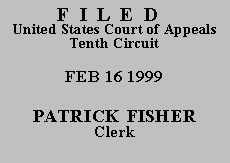

| SCOTT M. CROWLEY,
v.
JAN GRAHAM; and NEAL
GUNNERSON |
No. 98-3293
(D.C. No. 98-CV-3228) (D. Kan.) |
Crowley filed a petition for writ of habeas corpus under 28 U.S.C. § 2241, seeking dismissal of the detainer and an order that his remaining Utah sentence run concurrently with his federal sentence. The district court granted Crowley leave to file the petition in forma pauperis, but dismissed the petition. We grant Crowley leave to proceed on appeal in forma pauperis and affirm.
The petition, on its face, raises a jurisdictional issue which we must examine sua sponte. See Phelps v. Hamilton, 122 F.3d 1309, 1315-16 (10th Cir. 1997). Crowley is in federal prison, in custody of the warden of USP-Leavenworth, Kansas, but Crowley names as respondents two state officials of Utah. The habeas statute requires that a § 2241 petitioner state "the name of the person who has custody over him." 28 U.S.C. § 2242; see also Braden v. 30th Judicial Circuit Ct. of Ky., 410 U.S. 484, 494-95 (1973) ("The writ of habeas corpus does not act upon the prisoner who seeks relief, but upon the person who holds him in what is alleged to be unlawful custody."). Failure to do so is fatal to the petition. See Harris v. Champion, 51 F.3d 901, 906 (10th Cir. 1995) (dismissing habeas claim against Oklahoma Court of Criminal Appeals and the individual judges thereof because neither were the prisoner's custodian). Because neither Respondent Jan Graham, the Utah State Attorney General, nor Respondent Neal Gunnerson, Salt Lake District Attorney, were Crowley's custodians, they are not proper parties to a habeas action. Crowley has failed to name his warden as a respondent. Moreover, Crowley has failed to name an official with power to release him from custody under his federal sentence if the court were to rule in his favor. Accordingly, Crowley's § 2241 petition is jurisdictionally defective and the district court erred by reaching the merits.(1)
Crowley also asks this court to order the remaining time on his state sentence to run concurrently with his federal sentence. However, the question of whether a prisoner should receive credit against his state sentence for time served for a federal sentence in a federal institution is a question of state law that should first be raised with the Utah courts. Accordingly, this court has no authority to modify Crowley's state sentence retroactively to make it run concurrently with his federal sentence.
We AFFIRM the dismissal of Crowley's petition. The mandate shall issue forthwith.
ENTERED FOR THE COURT
David M. Ebel
Circuit Judge
*.After examining appellant's brief and the appellate record, this panel has determined unanimously that oral argument would not materially assist the determination of this appeal. See Fed. R. App. P. 34(a)(2) and 10th Cir. R. 34.1(G). The case is therefore ordered submitted without oral argument. This Order and Judgment is not binding precedent, except under the doctrines of law of the case, res judicata, and collateral estoppel. The court generally disfavors the citation of orders and judgments; nevertheless, an order and judgment may be cited under the terms and conditions of 10th Cir. R. 36.3.
1. We note, in any event, that IADA does not appear to be of any help to Crowley in this case. "Article III of the [IADA] gives a prisoner incarcerated in one State the right to demand the speedy disposition of 'any untried indictment, information or complaint' that is the basis of a detainer lodged against him by another State." Carchman v. Nash, 473 U.S. 716, 718 (1985). In Carchman, the Supreme Court held that a probation-revocation detainer does not qualify under the terms of Article III of the IADA because such a detainer is not based on "any untried indictment, information or complaint." The Court pointed out that IADA's use of "indictment, information or complaint" refers to documents charging an individual with having committed a criminal offense, and that the adjective "untried" refers to matters that can be brought to full trial. Id. at 724. A prisoner subject to a probation-violation charge would not be brought to full trial for violating probation. Instead, the Supreme Court explained,
the probation-violation charge results in a probation-revocation hearing, a proceeding to determine whether the conditions of probation should be modified or the probationer should be resentenced, at which the probationer is entitled to less than the full panoply of due process rights accorded a defendant at a criminal trial.
Id. at 725-26.
Given this reasoning, we find it obvious that the IADA does not apply to the detainer at issue here. Utah filed the detainer to ensure that Crowley finish serving the state sentence he cut-short by escaping from prison. Crowley would not be brought to full trial for failing to complete his sentence because, importantly, Utah dropped the untried criminal charges of escape. Since the IADA applies only to untried criminal charges, see McDonald v. New Mexico Parole Bd., 955 F.2d 631, 633 (10th Cir. 1991), the IADA does not apply to the detainer filed against Crowley. Thus, Crowley's request that we dismiss the detainer has no merit.